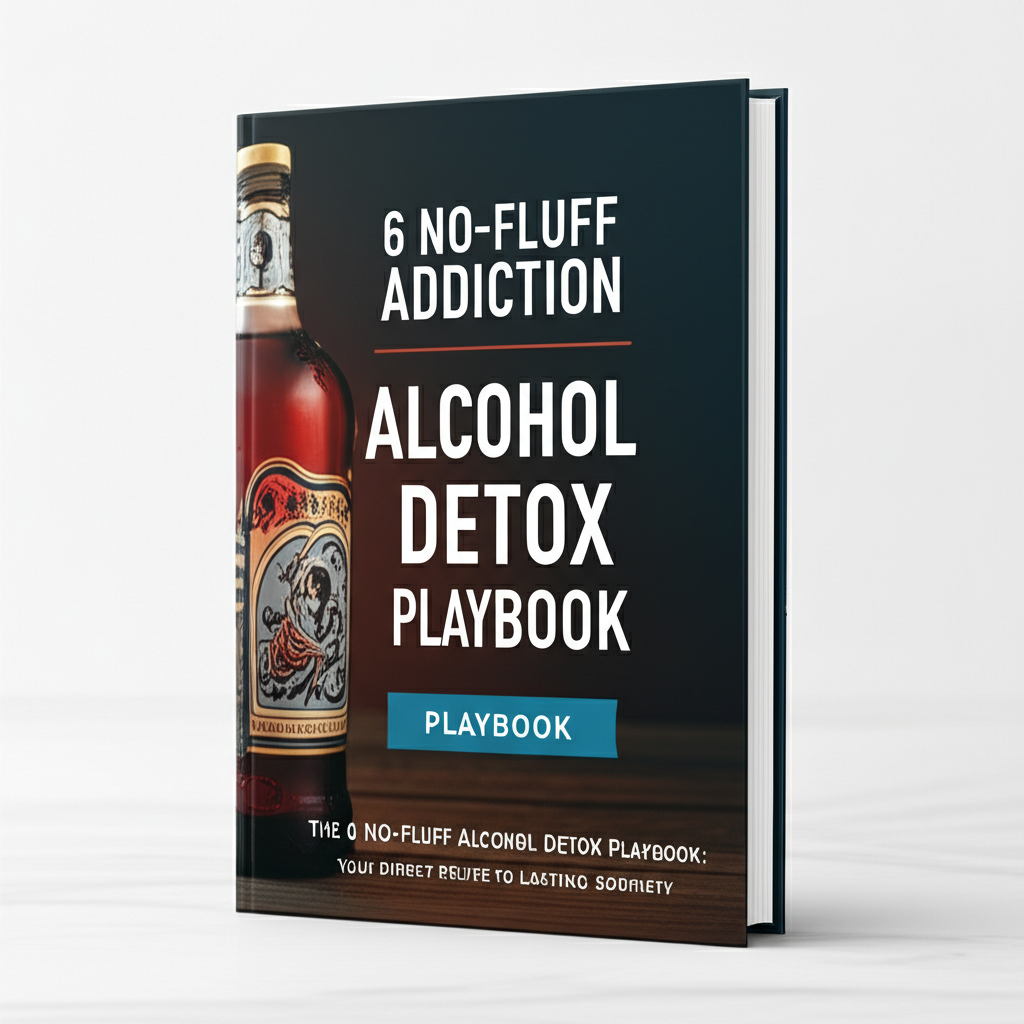The insidious grip of alcohol addiction can feel like an inescapable prison, stealing joy, health, and hope. For millions, the thought of breaking free is daunting, often overshadowed by fear of the unknown – particularly the challenging first step: detoxification. But imagine having a clear, actionable guide, a "playbook," to navigate this critical initial phase safely and effectively.
Detoxification, or "detox," is the process of ridding the body of alcohol and managing the acute physical symptoms of withdrawal. It’s not merely uncomfortable; for alcohol addiction, it can be life-threatening without proper medical supervision. This article will illuminate three primary, medically-backed playbooks for alcohol detox, designed to empower you with knowledge and guide you toward a healthier, alcohol-free future. From the intensive care of inpatient facilities to more flexible outpatient models, understanding these pathways is the first step on your journey to lasting recovery.
Understanding Alcohol Detox: The Crucial First Step to Healing
Before diving into specific playbooks, it’s vital to grasp why alcohol detox is so critical and often requires professional oversight. Alcohol, especially when consumed heavily and regularly, profoundly alters brain chemistry. When consumption stops, the body, accustomed to the presence of alcohol, reacts violently to its absence. This reaction is known as alcohol withdrawal syndrome (AWS).
The Dangers of Unsupervised Detox
Attempting to detox from alcohol alone, especially if you have a moderate to severe dependence, is incredibly dangerous and can be fatal. The body’s systems, particularly the central nervous system, go into overdrive without the depressant effects of alcohol.
Common Alcohol Withdrawal Symptoms Include:
- Mild to Moderate: Tremors (the "shakes"), anxiety, nausea, vomiting, headache, sweating, insomnia, rapid heart rate, mild hypertension. These usually begin 6-12 hours after the last drink.
- Severe:
- Hallucinations: Visual, auditory, or tactile hallucinations can occur 12-24 hours after the last drink.
- Withdrawal Seizures: These can happen 24-48 hours after the last drink and are a significant medical emergency.
- Delirium Tremens (DTs): The most severe form of withdrawal, DTs are characterized by confusion, disorientation, severe agitation, fever, profuse sweating, and dangerous fluctuations in heart rate and blood pressure. DTs typically manifest 48-72 hours after the last drink but can appear up to 10 days later. They are a medical emergency requiring immediate attention and can be fatal if untreated.
Medical supervision during detox ensures that these symptoms are managed safely, discomfort is minimized, and life-threatening complications are prevented.
What to Expect During Medical Detox
Regardless of the specific playbook chosen, medical detox generally involves:
- Comprehensive Assessment: A thorough evaluation of your medical history, substance use history, mental health, and physical condition to determine the appropriate level of care.
- Medication Management: Prescription medications are crucial to ease withdrawal symptoms, prevent seizures, and stabilize vital signs. Benzodiazepines (e.g., Ativan, Valium, Librium) are commonly used to calm the nervous system. Other medications may address nausea, sleep disturbances, or nutritional deficiencies.
- 24/7 Monitoring (in some settings): Medical professionals closely track your vital signs, symptom progression, and overall well-being.
- Nutritional Support: Alcohol addiction often leads to malnutrition. Detox includes restoring essential vitamins and minerals, particularly B vitamins.
- Emotional Support: The detox process can be emotionally taxing. Counseling and support from staff are integral.
- Transition Planning: Detox is just the beginning. A good detox program will help you plan for the next steps in your recovery journey, often involving inpatient or outpatient rehabilitation.
Playbook 1: The Inpatient Medical Detox – The Gold Standard for Safety and Support
For many, especially those with severe alcohol dependence, a history of complicated withdrawal, or co-occurring mental health disorders, inpatient medical detox is the safest and most effective option. This playbook offers a highly structured, supervised environment away from the triggers and stresses of daily life.
Who is Inpatient Detox For?
- Individuals with severe alcohol use disorder.
- Those with a history of severe withdrawal symptoms, including seizures or Delirium Tremens.
- People with co-occurring medical conditions (e.g., heart disease, liver disease) that could complicate detox.
- Individuals with co-occurring mental health disorders (e.g., severe anxiety, depression, bipolar disorder).
- Anyone lacking a stable, supportive home environment for outpatient detox.
- Those who have previously attempted detox unsuccessfully.
What Inpatient Detox Entails
In an inpatient setting, you reside at a specialized medical facility, hospital, or dedicated detox center for the duration of your withdrawal.
- 24/7 Medical Supervision: Nurses, doctors, and addiction specialists are on-site around the clock to monitor your condition, administer medications, and respond to any emergencies.
- Safe, Controlled Environment: You are removed from external stressors and access to alcohol, allowing your body to focus solely on healing.
- Comprehensive Medication Management: A personalized medication regimen is administered and adjusted as needed to manage withdrawal symptoms effectively and prevent complications.
- Nutritional Restoration: Balanced meals and supplements are provided to help your body recover from the nutritional deficiencies often associated with chronic alcohol use.
- Introduction to Therapy: While the primary focus is physical stabilization, many inpatient detox programs begin introducing individual or group therapy sessions to prepare you for the next stages of recovery.
- Comfort and Support: A calm, empathetic environment staffed by professionals who understand the challenges of withdrawal.
Pros and Cons of Inpatient Medical Detox
Pros:
- Highest Level of Safety: Constant medical monitoring minimizes risks.
- Complete Removal from Triggers: A sober environment fosters initial healing.
- Comprehensive Care: Addresses physical, mental, and nutritional needs.
- Reduced Relapse Risk (during detox): No access to alcohol.
- Foundation for Further Treatment: Often integrated with subsequent rehab programs.
Cons:
- Cost: Generally the most expensive option.
- Time Commitment: Requires being away from home, work, and family.
- Lack of Privacy: Living in a shared environment.
- Potential for Stigma: Though decreasing, some may feel self-conscious.
Example: Imagine entering a serene, private room. A nurse immediately checks your vital signs, asks about your last drink, and explains the process. You’re given a mild sedative to calm your nerves, and regular checks ensure your comfort. Throughout the next few days, doctors adjust your medication, therapists offer brief, supportive talks, and nourishing meals are provided. You might feel uncomfortable, but you are never alone or unsafe.
Playbook 2: The Outpatient Medical Detox – Flexible Care with Strong Support
For individuals with milder alcohol dependence and a stable, supportive home environment, outpatient medical detox can be a viable and effective option. This playbook allows you to detox at home while attending regular appointments at a clinic or doctor’s office for medical monitoring and medication.
Who is Outpatient Detox For?
- Individuals with mild to moderate alcohol use disorder.
- Those with a strong support system at home (family, friends) who can assist.
- People with no history of severe withdrawal symptoms (seizures, DTs).
- Individuals without severe co-occurring medical or mental health conditions.
- Those who require flexibility due to work, family responsibilities, or financial constraints.
- Someone with a safe, stable, and alcohol-free living environment.
What Outpatient Detox Entails
In an outpatient setting, you live at home and commute to a clinic or physician’s office for daily or near-daily check-ups.
- Regular Medical Check-ins: You’ll have scheduled appointments where medical staff monitor your vital signs, assess withdrawal symptoms, and adjust medication as needed.
- Prescription Medications: Medications (typically benzodiazepines) are prescribed to manage withdrawal symptoms, often with specific instructions on dosage and frequency. Some clinics may administer doses directly.
- Therapeutic Support: Many outpatient programs include regular individual or group counseling sessions to address the psychological aspects of addiction and prepare for long-term recovery.
- Education and Resources: You’ll receive information about addiction, relapse prevention strategies, and referrals to ongoing treatment and support groups.
- Emergency Protocol: A clear plan for what to do if severe withdrawal symptoms develop, including emergency contact numbers and instructions for seeking immediate medical attention.
Pros and Cons of Outpatient Medical Detox
Pros:
- Flexibility: Allows you to maintain work, family, and other responsibilities.
- Cost-Effective: Generally less expensive than inpatient detox.
- Comfort of Home: You can detox in your familiar environment.
- Privacy: More discreet than an inpatient stay.
Cons:
- Higher Risk of Relapse: Exposure to triggers and easier access to alcohol.
- Requires Strong Self-Discipline: Must adhere strictly to medication schedules and appointments.
- Less Intensive Supervision: Not suitable for severe withdrawal risks.
- Reliance on Home Support: A sober and supportive home environment is crucial.
- Potential for Isolation: If not actively engaged in support systems.
Example: You meet with your doctor each morning. They take your blood pressure, ask about your symptoms (tremors, nausea, anxiety), and adjust your prescription for Librium. You return home, follow the medication schedule, and your spouse checks on you frequently. You also attend an online therapy group in the evenings, connecting with others on a similar path. You know exactly who to call if you feel symptoms worsening significantly.
Playbook 3: At-Home Assisted Detox – The Medically-Supervised Exception
It’s crucial to preface this section: At-home detox without any medical supervision is extremely dangerous and strongly discouraged. This "playbook" refers specifically to a medically-assisted and closely monitored home detox, which is a rare and highly selective option, typically a variant of outpatient care. It should only be considered under the strictest medical guidance and for very specific, low-risk circumstances.
Who is At-Home Assisted Detox Potentially For?
- Individuals with very mild alcohol dependence.
- Those with no history of severe withdrawal, seizures, or DTs.
- People with excellent overall physical health and no significant co-occurring medical or mental health issues.
- Someone living with a highly responsible, sober adult who can provide 24/7 supervision and administer medications.
- Individuals with immediate access to emergency medical services.
- Those who have undergone a thorough medical evaluation and deemed exceptionally low-risk by a healthcare professional.
What At-Home Assisted Detox Must Entail
This is not a DIY project. It requires a comprehensive, physician-managed plan.
- Daily Physician Check-ins: Often via telehealth, with clear instructions for in-person visits if needed.
- Prescribed Medications: A specific regimen of medications (e.g., benzodiazepines) provided by the physician, with detailed instructions for the patient and their live-in supervisor.
- Constant Live-in Supervision: A responsible, sober adult must be present at all times to monitor symptoms, administer medication, and respond to emergencies.
- Emergency Action Plan: A clear, written plan detailing warning signs for severe withdrawal, emergency contact numbers, and immediate transportation to an emergency room.
- Medical Equipment: Access to a blood pressure cuff, thermometer, and pulse oximeter for daily readings.
- Immediate Access to Care: Living close to an emergency facility.
Why At-Home Assisted Detox is Rarely Recommended
The inherent risks associated with alcohol withdrawal make this option suitable for only a tiny fraction of individuals seeking detox. The margin for error is extremely thin, and the potential for life-threatening complications is ever-present. Most medical professionals will strongly advise against it unless all the above stringent criteria are met, and even then, with extreme caution.
Pros and Cons of At-Home Assisted Detox (Under Strict Medical Supervision)
Pros:
- Maximum Comfort and Privacy: Detoxing in your own home.
- Potentially Lowest Cost: Compared to inpatient care.
- Minimal Disruption: Allows you to stay in your routine (with supervision).
Cons:
- Highest Risk of Complications: Even with supervision, medical emergencies can arise quickly.
- Immense Responsibility: Places significant burden on the live-in supervisor.
- Accessibility to Alcohol: Increased temptation and risk of relapse.
- Lack of Specialized Resources: No immediate access to advanced medical equipment or specialists.
- Isolation: Can feel very isolating without the structured support of a facility.
- Rarely an Option: Most individuals will not qualify due to safety concerns.
Example: A physician, after a comprehensive assessment, agrees to a supervised home detox for a patient with very mild dependence. The patient’s sober sister moves in for a week. The doctor prescribes a low dose of Ativan, and the sister is trained to administer it and monitor vital signs every few hours. Daily video calls with the doctor review symptoms, and a hospital bag is packed, ready for an immediate ER visit if any severe symptoms appear. This is a highly controlled and exceptional circumstance.
Beyond Detox: The Road to Lasting Recovery
It’s crucial to reiterate: detoxification is merely the first step. It addresses the physical dependence on alcohol, but it does not address the underlying psychological, emotional, and behavioral issues that fuel addiction. Without continued treatment, the risk of relapse after detox is incredibly high.
The Importance of Aftercare
A successful detox leads directly into a comprehensive aftercare plan. This plan is your long-term strategy for sobriety and well-being.
Components of a Comprehensive Recovery Plan:
- Therapy and Counseling:
- Individual Therapy: Cognitive Behavioral Therapy (CBT), Dialectical Behavior Therapy (DBT), Motivational Interviewing (MI) help identify triggers, develop coping mechanisms, and address co-occurring mental health issues.
- Group Therapy: Provides peer support, shared experiences, and a sense of community.
- Family Therapy: Addresses family dynamics impacted by addiction and helps rebuild relationships.
- Support Groups:
- Alcoholics Anonymous (AA): A 12-step program offering peer support and a spiritual path to recovery.
- SMART Recovery: A science-based program focusing on self-empowerment and self-reliance.
- Refuge Recovery: A Buddhist-inspired approach to addiction recovery.
- Medication-Assisted Treatment (MAT):
- Naltrexone: Reduces alcohol cravings and the pleasurable effects of alcohol.
- Acamprosate: Helps reduce post-acute withdrawal symptoms and cravings.
- Disulfiram (Antabuse): Causes an unpleasant reaction when alcohol is consumed, acting as a deterrent.
- Lifestyle Changes:
- Developing healthy routines (sleep, exercise, nutrition).
- Finding new hobbies and interests.
- Building a sober support network.
- Stress management techniques.
- Relapse prevention planning.
Conclusion: Choosing Your Path to Freedom
The journey to freedom from alcohol addiction begins with a brave decision and a safe, effective detox. There isn’t a one-size-fits-all solution; the "best" detox playbook is the one that aligns with your individual needs, the severity of your dependence, and your personal circumstances.
- For comprehensive safety and support, Inpatient Medical Detox stands as the gold standard.
- For flexibility and continued daily life, Outpatient Medical Detox offers a supported pathway.
- For very specific, low-risk cases, a Medically-Supervised At-Home Detox might be considered, but always with extreme caution and professional oversight.
No matter which playbook you consider, remember that professional medical advice is paramount. Do not attempt to detox from alcohol alone. Reach out to a healthcare provider, an addiction specialist, or a reputable treatment center. They can conduct a thorough assessment, discuss your options, and help you choose the safest and most effective path forward. Detox is an act of profound self-care, a vital first step in reclaiming your health, your happiness, and your life. The freedom you seek is within reach.








